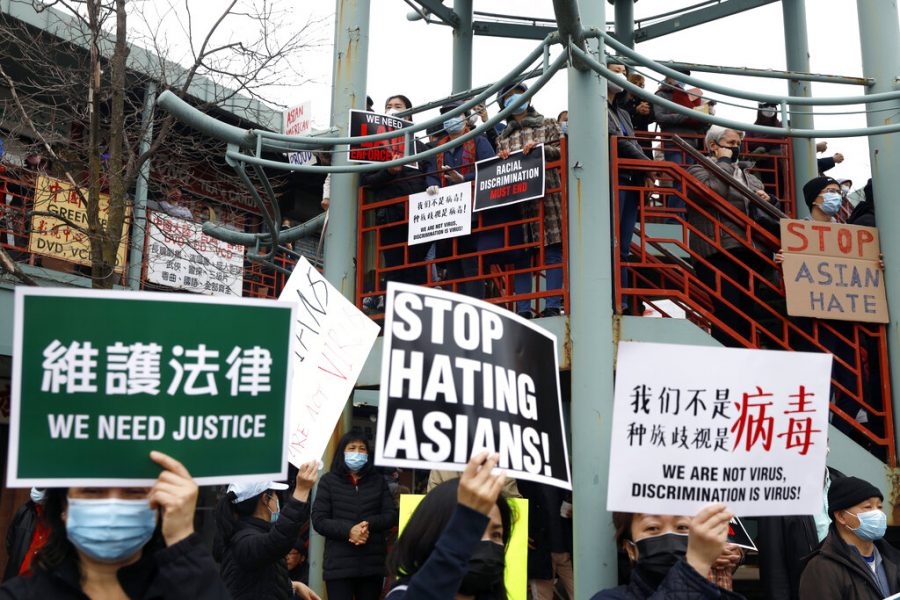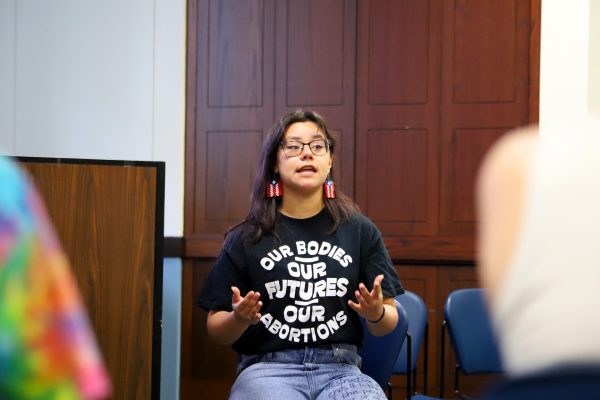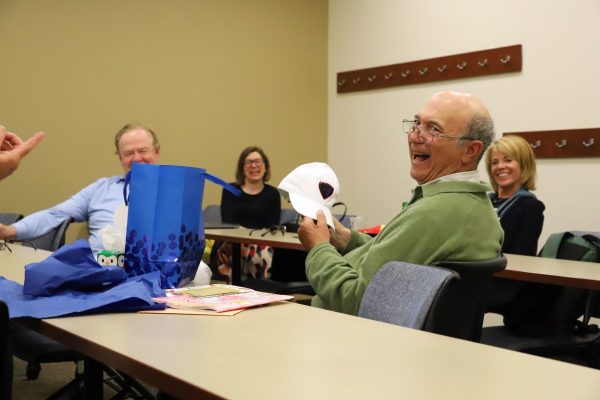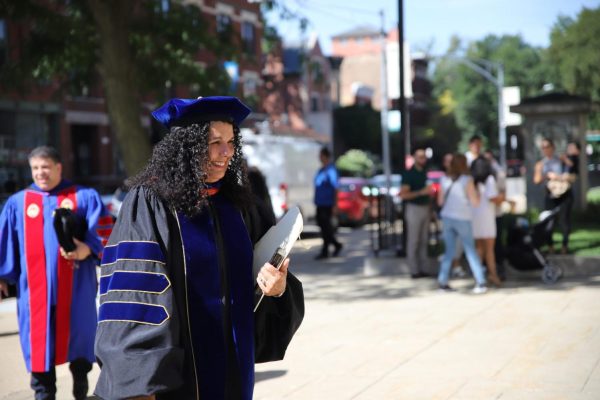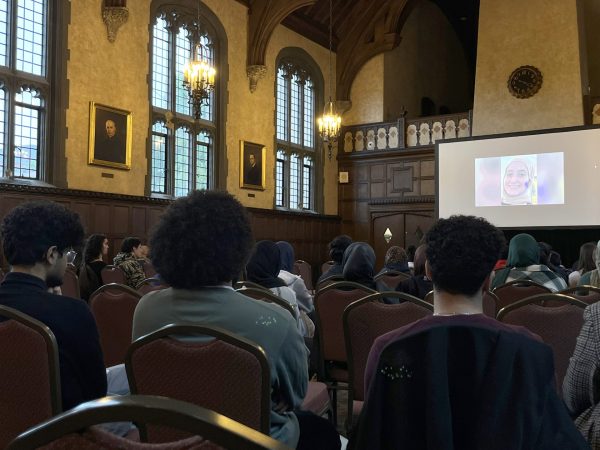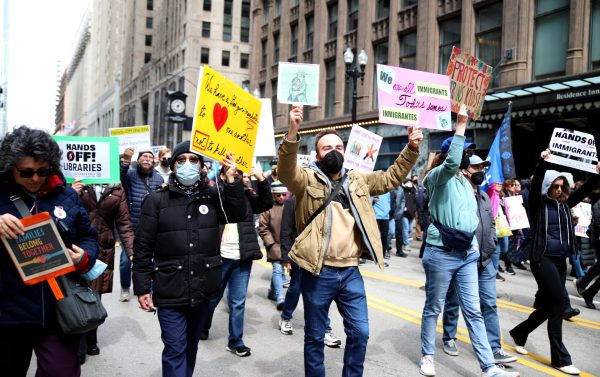How DePaul is commemorating APIDA Heritage Month among rising hate incidents
AP for The DePaulia
Demonstrators holding signs take part in a rally against Asian hate crimes, Saturday, March 27, 2021 at Chinatown in Chicago. The gathered crowd demanded justice for the victims of the Atlanta spa shooting and for an end to racism, xenophobia and misogyny. (AP Photo/Shafkat Anowar)
May marks Asian, Pacific Islander and Desi American (APIDA) Heritage Month, a time to commemorate and celebrate APIDA culture and history in the United States.
To commemorate APIDA Heritage Month, DePaul’s Office of Multicultural Student Success (OMSS), APIDA Cultural Center and Asian Cultural Exchange have scheduled a variety of virtual programs, including a three part YouTube Live series. A full list of virtual programs can be found on the OMSS’ Facebook or Instagram.
Additionally, the fourth annual Grace Lee Boggs APIDA heritage event will be held on May 21. Various groups, such as DePaul’s Asian and Asian-American professional community ELEVATE, DePaul’s Women’s Network, and the Global Asian Studies program, are sponsoring this event.
Since its inception as Asian/Pacific American Heritage Week in 1979, APIDA Heritage Month has expanded after Congress passed a bill in 1992 to designate May as “Asian-Pacific American Heritage Month.”
May was chosen as APIDA Heritage Month for its historical importance. The first Japanese immigrants arrived in the United States on May 7, 1843. Twenty-six years later, on May 10, 1869, the first transcontinental railroad was completed with the help of over 10,000 Chinese workers.
“When we look at Asian American history and the role of Asian Americans in the United States, we are instantly tied to a range of different kinds of issues: whether they are related to immigration, to racial issues in the United States, civil rights issues and more, our community has played an important role in shaping the United States since our arrival,” said Ryan Yokota, critical ethnic studies professor DePaul.
Yokota mentioned Supreme Court cases such as United States v. Wong Kim Ark, which established the guidelines of birthright citizenship, and figures like Larry Itliong and Philip Vera Cruz, Filipino-American farmworkers who organized with Cesar Chavez and other Mexican farm workers to improve working conditions.
“These are important parts of what it means to be American that we take for granted, and a lot of people don’t recognize or understand the ways in which Asian Americans had a role in ensuring that these kinds of civil rights are applicable to anyone regardless of their citizenship or nationality,” Yokota said.
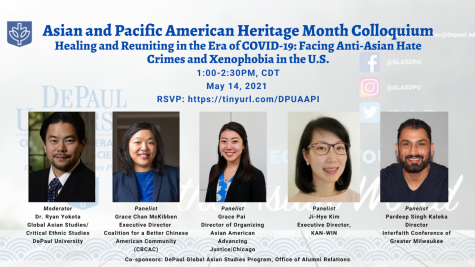
DePaul’s Director of Chinese Studies and Global Asian Studies, Li Jin, also stresses the important role that members of the APIDA community have in history.
“The history of North America is shaped by the stories of immigrants from Asia and the Pacific as well as indigenous people of the Pacific Islands,” Jin said. “The development of the U.S. is inseparable from numerous contributions and sacrifices made by the AAPI community members. Asian Americans are the fastest-growing racial or ethnic group in the U.S. However, Asian American history has rarely been taught in our school system.”
“The AAPI Heritage Month is a dedicated time to both celebrate Asian and Pacific Island American culture and learn more of their history,” she continued.
According to the Pew Research Center, the Asian American population reached a record 18.9 million in 2019. Of the 21,922 total students enrolled at DePaul, 2,331 of students reported their race as Asian, according to DePaul’s 2020 enrollment summary.
“We would like to use this special month to help people of various backgrounds learn more about the contributions the AAPI community members have been making to the U.S. society as well as perpetual and new sufferings they are facing,” Jin said.
DePaul hosted its annual Asian and Pacific American Heritage Month Colloquium on May 14, dedicated to educating and discussing one of these new sufferings.
The colloquium, titled “Healing and Reuniting in the Era of COVID-19: Facing Anti-Asian Hate Crimes and Xenophobia in the U.S.,” featured four Asian American community leaders discussing the increase of anti-Asian hate crimes and providing advice for Asian Americans and allies.
The pandemic has impacted students of all backgrounds at DePaul, including the APIDA community. Many facets of university life have been forced to transition to an online format, from classes to club and organization events — such as the ones held by the OMSS. In response to an increase in anti-Asian hate crimes during the pandemic, a group of Asian and Asian American leaders at DePaul, including Jin, recently released a statement calling for an end to Asian hate.
“The APIDA communities here at DePaul have been severely impacted as a result of Covid, just like everybody else,” said Yokota, who acted as the moderator for the colloquium. “But we bear a special burden because of the way in which anti-Asian sentiment has been stoked during the last presidency, both in terms of anti-China sentiment, as well as in terms of labeling the Covid pandemic as things like the ‘China flu’ or the ‘Kung Flu.’”
One of the speakers of the colloquium was Grace Chan McKibben, the director of the Coalition for a Better Chinese American Community in Chicago. The CBCAC works alongside other groups such as the Chinese American Association of Greater Chicago to empower and develop Chinese communities in the Chicago area.
“It is important while we celebrate APIDA Heritage Month by celebrating Asian American accomplishments, our culture, and highlighting the positives, we should also note that it’s in the midst of this struggle and the challenge of discrimination and even violent incidents against Asian Americans,” McKibben said.
While anti-Asian hate incidents in the United States have increased significantly from 3,795 to 6,603 during March 2021, according to reports from Stop AAPI Hate, McKibben stresses the importance of “cross-group solidarity”: working together to make sure that every group is treated with respect.
“I believe that despite the number of incidents, there are way more people who believe in equality and inclusion than people that don’t,” McKibben said. “It’s just that folks need to stand up and show up and be there for each other, and only with that will we be able to overcome some of these challenges.”


